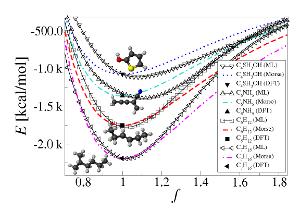| AI Does Chemistry |
| Written by Mike James | |||
| Tuesday, 28 February 2012 | |||
|
The AI approach to chemistry might have you thinking of robots doing experiments, but in this case the machine learning predicts the properties of molecules from their basic construction. In principle chemistry is just a matter of solving the Schrodinger equation - but for real systems this is a tough challenge. Being able to predict physical properties from molecular structures is of practical importance and perhaps AI can help.
Instead of solving the Schrodinger equation the researchers trained a machine learning (ML) algorithm to predict molecular atomization from a training set of small molecules. Once trained the ML algorithm was cross validated on a set of unseen compounds. The input data was the same as would form the basis for the Schrodinger equation, i.e. both methods start out with the same data, atomic positions and charges. The machine learning algorithm used was kernel-based ridge regression and it succeeded in learning the non-linear relationship well enough to predict the atomization of the unseen molecules better than competing simple methods.
(click in chart to enlarge) Should this be a surprising result? Given any technical problem you can take the theory and construct an exact solution - i.e. the Schrodinger equation in this case - which you can then solve usually via an approximation. The theory gives you a generally non-linear relationship between the inputs and the outputs. The AI approach simply avoids the theory and learns the non-linear relationship. You just have to find the right learning method and fit the model to the data well enough to take account of the behaviour without overfitting. At the end of the day, you have the same predictive power and the AI solution will usually be much faster to compute. However, it will also be far less satisfying to the practitioner than the deep theory that also "explains" what is going on. There are still many more situations in which AI techniques can provide faster alternative solutions than the traditional theory based approach. More informationFast and Accurate Modeling of Molecular Atomization Energies with Machine Learning,Physical Review Letters, 2012 10.1103/PhysRevLett.108.058301 Fast and Accurate Modeling of Molecular Atomization Energies with Machine Learning,arxiv.org/abs/1109.2618 Book ReviewA First Course in Machine Learning
Comments
or email your comment to: comments@i-programmer.info
To be informed about new articles on I Programmer, subscribe to the RSS feed, follow us on Google+, Twitter, Linkedin or Facebook or sign up for our weekly newsletter.
<ASIN:1439824142> |
|||
| Last Updated ( Tuesday, 28 February 2012 ) |


